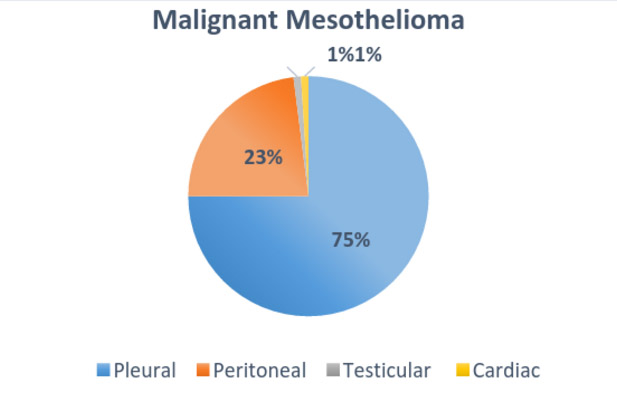Malignant mesothelioma is a type of cancer that develops from the thin layer of tissue that covers many of the body’s internal organs. These types include: pleural (covering the lungs and chest wall), peritoneal (covering the abdomen), testicular (lining of the testis), and cardiac (over the heart). While most mesothelioma cancers are malignant, there are some subtypes that are not. These benign types are typically treated with surgery alone.
| Type of Mesothelioma | Malignant or Benign |
| Pleural | Malignant |
| Peritoneal | Malignant |
| Testicular | Malignant |
| Cardiac | Malignant |
| Multicystic peritoneal | Benign |
| Well-differentiated papillary | Benign |
Unfortunately, most mesothelioma cases are malignant. The most frequently encountered cases are pleural (about 2,000 cases a year in the U.S.) and peritoneal (less than 1,000 cases a year in the U.S.).

Mesothelioma Cell Types
There are three cell types for this type of cancer: epithelioid, sacromatoid and biphasic.
- About half of malignant mesotheliomas are epithelioid. This type tends to have a better prognosis.
- About 10% of mesotheliomas are sarcomatoid. This type generally has the worst prognosis with standard therapies.
- Mixed (biphasic) mesotheliomas are comprised of both epithelioid and sarcomatoid cells. They represent about 30% to 40% of the diagnoses.
Cause
Malignant mesothelioma is generally caused by exposure to asbestos. While other potential causes such as radiation therapy or the virus SV40 has been implicated in some studies, the vast majority of cases are caused by asbestos exposure.
Symptoms
Symptoms of malignant mesothelioma vary based on where the cancer is located. A thorough medical work-up that may include imaging such as Cat Scans and a biopsy may be needed to accurately diagnose malignant mesothelioma.
Prognosis
Typical prognosis with the best conventional treatments available provides median survival of a little over a year for pleural mesothelioma and about five years for peritoneal mesothelioma. However, there are long term survivors. Paul Kraus is not the only person diagnosed with mesothelioma to survive long past their diagnosis. There are many others such as Rhio O’Connor, Ruth Phillips, and Gene Adoline. In addition, there are many others we have heard about or spoken to over the years. What is fascinating is that many of these mesothelioma survivors have something in common – they have all taken steps to improve or enhance their immune system. Some used alternative or complimentary therapies (with guidance from licensed clinicians) while others participated in clinical trials of immune therapy.
Immune System and Mesothelioma
This raises the question – does the immune system play a role in controlling malignant mesothelioma? Paul Kraus’ experience and those of other long-term mesothelioma survivors suggests that such a role may be possible. In fact, here’s an interesting question: While scientists tell us that asbestos causes mesothelioma, why is it that only a small percentage of people exposed to asbestos are ever diagnosed with mesothelioma? Could there be another aspect that makes some people susceptible to the disease? Some doctors have contemplated that a patient’s immune status could play a role in the genesis of mesothelioma and other cancers. If this is true, it would explain why immune boosting modalities could help some patients control their disease.
In other sections of this website we present case histories of malignant mesothelioma survivors who were diagnosed with either pleural mesothelioma or peritoneal mesothelioma. In some of the pleural mesothelioma case histories, doctors discuss the role that the patient’s immune system may have played in their extremely long survival.
Mesothelioma and Immune System Reports in Medical Journals
In fact there are reports in peer reviewed medical journals that do suggest that the immune system plays a role in malignant mesothelioma.
History of Malignant Mesothelioma and Immunity
In 1986, an article appeared in a medical journal that discussed this very issue of mesothelioma and immunity.(1) This research focused on the immune responses of 118 healthy people compared to 20 patients with malignant mesothelioma and 375 long-term asbestos workers who were cancer-free. The researchers wanted to know if there were any measurable differences in the immune responses of the mesothelioma patients. Their findings demonstrated a relationship between the immune system and mesothelioma. For example:
The number of total T (T11+) and T-helper (T4+) cells were normal in asbestos workers with cancer, but were significantly reduced in patients with mesothelioma. T cells orchestrate, regulate and coordinate the overall immune response. This suggests that the immune systems of mesothelioma patients may be compromised by mesothelioma or perhaps a compromised immune system allowed the disease to advance.
Most patients with mesothelioma had a profound deficiency in Natural Killer cell (NK) activity which is suggestive of the role the immune system plays in the control of malignant mesothelioma. NK cells are a type of lethal lymphocyte that target tumor cells and protect against a wide variety of infectious microbes.
In the discussion section of the report, the researchers stated:
“These findings led us to speculate that biological phenomena generally categorized as chronic immunosuppression associated with the presence of asbestos fibers in the exposed workers may have caused the eventual breakdown of the host’s surveillance system and the onset of neoplasm.”
In other words, the researchers are suggesting that mesothelioma may result from immune suppression. If this is true it would provide the biological basis for the role that the immune system and immune boosting approaches may play in the management of mesothelioma. For example, if a “breakdown” in a patient’s immune system helped lead to cancer then a corollary would be that strengthening the immune system would be beneficial in managing the disease. These are theories only and should be studied further. If you are interested in learning more about immune boosting modalities, speak to your doctor.
Endnotes
(1) Lew, F., et al., High Frequency of Immune Dysfunctions in Asbestos Workers and in Patients with Malignant Mesothelioma, Journal of Clinical Immunology; 1986, 6:3, 225-232.
Quick Links
Pleural Mesothelioma: https://survivingmesothelioma.com/mesothelioma/pleural/
Peritoneal Mesothelioma: https://survivingmesothelioma.com/mesothelioma/peritoneal/
Testicular and Cardiac Mesothelioma: https://survivingmesothelioma.com/mesothelioma/testicular-cardiac/